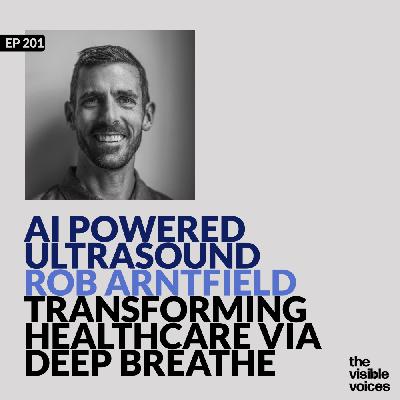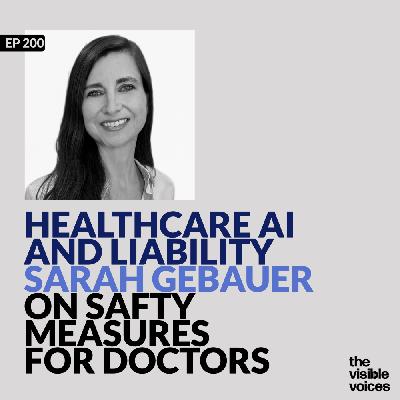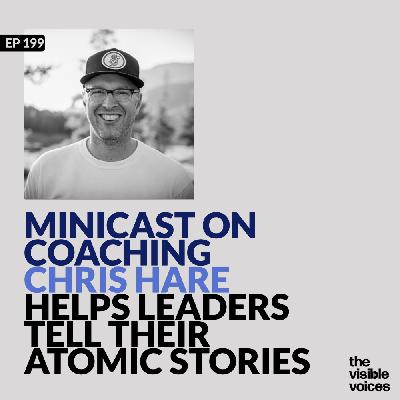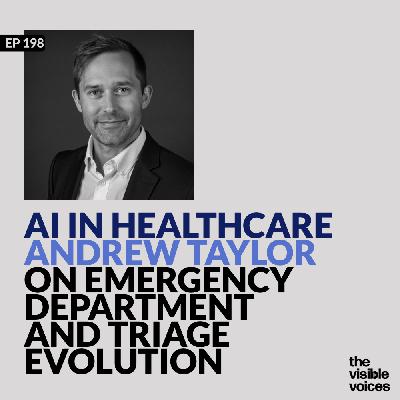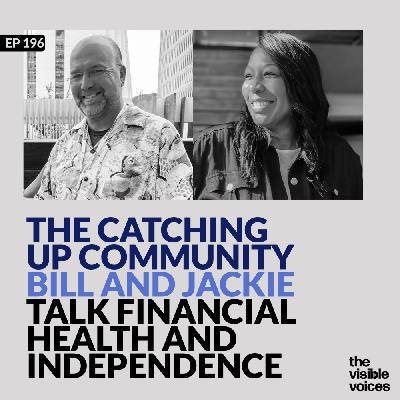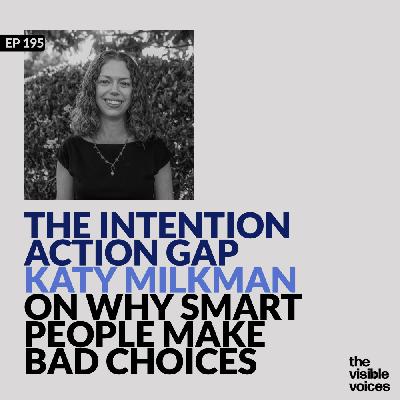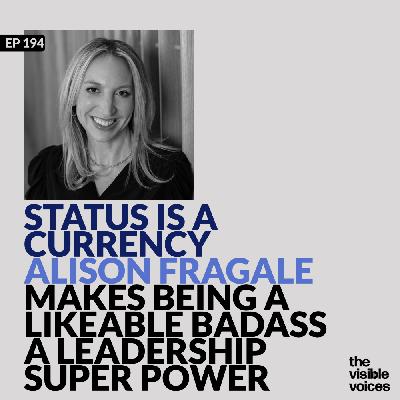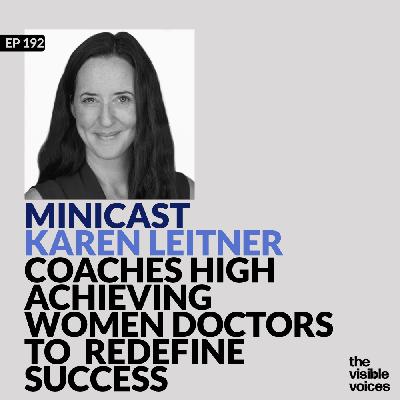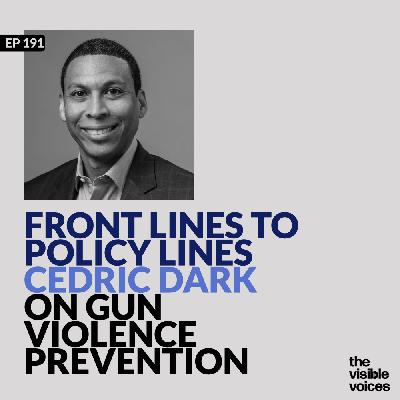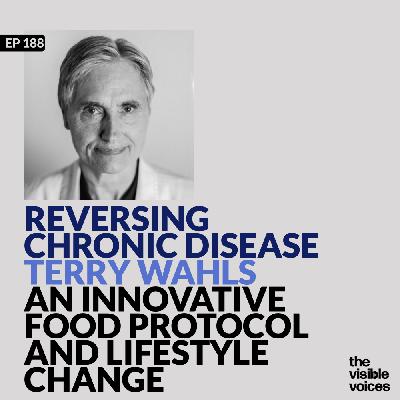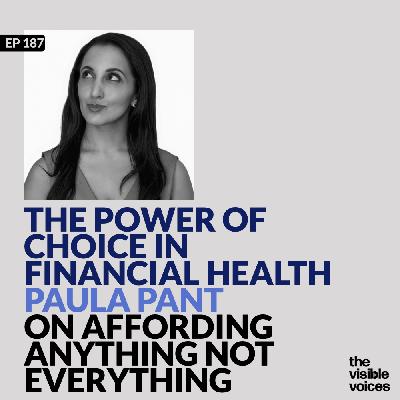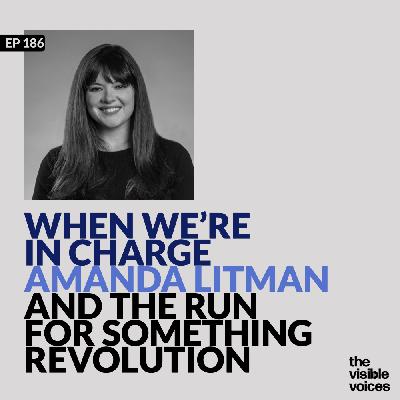Discover The Visible Voices
The Visible Voices

The Visible Voices
Author: Resa E Lewiss
Subscribed: 4Played: 57Subscribe
Share
© Copyright 2025 All Rights Reserved
Description
The Visible Voices podcast amplifies voices that are Visible and those that may be Invisible. We speak on topics related to healthcare, equity, and current trends. Based in Philadelphia, and hosted by physician Resa E. Lewiss, we really like speaking with people like you.
217 Episodes
Reverse
In this episode, we speak with Dr. Amna Shabbir about the pervasive impact of perfectionism on physicians and high achievers.
Dr. Shabbir, who is dual board-certified in internal medicine and geriatric medicine with advanced training in integrative wellbeing and behavior change, hosts the Success Reimagined podcast and recently delivered a TEDx talk on this topic. She explains the three types of perfectionism that particularly affect physicians: self-oriented ("I must be perfect"), other-oriented ("others must be perfect"), and socially prescribed ("the world demands perfection from me").
The conversation explores Dr. Shabbir's coaching philosophy, which focuses on moving from perfectionism to what she calls "excellence-ism" and making success sustainable without sacrificing wellbeing.
Content Warning: This episode discusses mental health crises among healthcare workers, postpartum depression, and perfectionism. If you or someone you know is struggling, please reach out. The National Suicide Prevention Lifeline is 988.
If you enjoy the show, please leave a ⭐⭐⭐⭐⭐ rating on Apple or a 👍🏻 on YouTube. Subscribe via the Website. Forward to a friend today!
Dr. Mizuho Morrison is Chief Medical Officer of EM:RAP emergency medicine: reviews and perspectives. A visionary physician-entrepreneur who trained in emergency medicine at LA County USC, she has revolutionized medical education through podcasting, video content, and CorePendium—EM:RAP's comprehensive online medical encyclopedia that updates daily.
Mizuho was doing physician "side gigs" before it went mainstream. In 2014 she co-founded a startup 3MD (Three Mommy Doctors LLC). Mi has served as Editor-in-Chief of Hippo Education podcasts, lead editor for Urgent Care Reviews and Perspectives, and co-director of Essentials of Emergency Medicine.
As CMO of EM:RAP, Dr. Morrison provides insights into how artificial intelligence is shaping the future of medical education while maintaining the delicate balance between technological innovation and trusted, peer-reviewed content. EM:RAP offers a variety of educational resources, including monthly updates, reviews of research papers, and expert discussions on common patient presentations. EM:RAP also provides educational products, such as audio and video contentShe discusses EM:RAP's strategic approach to educational innovation in a rapidly evolving digital landscape.
If you enjoy the show, please leave a ⭐⭐⭐⭐⭐ rating on Apple or a 👍🏻 on YouTube. Subscribe via the Website. Forward to a friend today!
In this episode, we speak with Rob Arntfield MD, the emergency medicine and critical care physician who founded Deep Breathe, an AI company whose technology actually surpassed doctors in COVID-19 lung ultrasound diagnosis. Rob shares his journey of merging computer science roots with medical expertise during the pandemic to create breakthrough diagnostic technology.
Rob is a self-described "acutivist" working as an emergency medicine and critical care physician at London Health Sciences Centre. He serves as Professor of Medicine at Western University and co-authored the textbook Point-of-Care Ultrasound.
Website: https://www.deepbreathe.ai/
If you enjoy the show, please leave a ⭐⭐⭐⭐⭐ rating on Apple or a 👍🏻 on YouTube. Subscribe via the Website. Forward to a friend today!
In this episode, we speak with Sarah Gebauer MD anesthesiologist and RAND Senior Researcher, who discusses the critical questions facing healthcare professionals as AI becomes integrated into clinical practice. She's the author of "Machine Learning for MDs" newsletter and published research on physician attitudes toward AI including the BMJ Evidence-Based Medicine article Survey of US physicians' attitudes and knowledge of AI. Her company Validara Health works on evaluation frameworks for healthcare AI implementation.
Physicians have been using AI for EKG interpretation for decades without fully understanding the algorithms, highlighting that transparency should focus on appropriate usage rather than complete technical knowledge. Most current AI tools operate as Software as a Service rather than regulated Medical Devices, while the FDA struggles to keep pace with rapid AI development. Despite their challenging history with EHR implementation, physicians show strong interest in learning about AI when they believe it will help patients.
The medical liability landscape remains uncertain until legal precedents are established through jury awards, making documentation of clinical decision-making crucial when using AI as additional information alongside other clinical data. Traditional machine learning evaluation metrics often fail to predict real-world clinical performance, where workflow integration and clinician experience prove more important than laboratory results. For professional development, busy physicians benefit most from resources that push information directly to them, such as newsletters and targeted social media follows, rather than formal courses requiring active searching.
Some places to follow along with AI in healthcare:
Machine Learning for MDs newsletter
TLDR AI newsletter
a16z healthcare
If you enjoy the show, please leave a ⭐⭐⭐⭐⭐ rating on Apple or a 👍🏻 on YouTube. Subscribe via the Website. Forward to a friend today!
This Visible Voices Minicast episode features Chris Hare, big tech marketer turned founder of The Storied Future, podcast host of The Storied Future, and atomic storytelling coach. Chris helps leaders navigate high-stakes transitions through vulnerable storytelling.
This episode is part of the 2025 monthly minicast series focusing on coaching, recognizing that we all need help in our professional journeys and do better with support along the way.
Atomic storytelling involves discovering stories that have been hidden, forgotten, or overlooked and using them as raw material to create a better future. Unlike traditional storytelling that focuses on structure and delivery, atomic storytelling asks what story should be told and disrupts limiting narratives that leaders have been telling for years.
For further reading, Chris recommends the book "Primal Intelligence" by Angus Fletcher
If you enjoy the show, please leave a ⭐⭐⭐⭐⭐ rating on Apple or a 👍🏻 on YouTube. Subscribe via the Website. Forward to a friend today!
In this episode of The Visible Voices Podcast, Dr. Resa Lewiss explores AI in healthcare with Andrew Taylor MD MHS, a Professor and Vice Chair of Research and Innovation in Emergency Medicine at the University of Virginia.
Dr. Taylor shares insights from his work on AI-informed triage systems, discusses the challenges of implementing AI in hospital settings, and explains how artificial intelligence can reduce diagnostic errors while promoting fairness in emergency care.
Healthcare lags behind other industries in adopting AI tools, facing unique challenges around hospital infrastructure and personnel requirements. Large language models require substantial computational resources that most traditional hospital systems lack. The persistent problem of closed electronic health record systems further complicates implementation. Healthcare typically can take 15 years to adopt new technologies, even those with proven efficacy and safety records.
Publications we discuss:
—Impact of Artificial Intelligence-Based Triage Decision Support on Emergency Department Care (NEJM AI)
—Leveraging Artificial Intelligence to Reduce Diagnostic Errors in Emergency Medicine: Challenges, Opportunities, and Future Directions (AEM)
—Enhancing Emergency Department Triage Equity With Artificial Intelligence: Outcomes From a Multisite Implementation (Annals of EM)
If you enjoy the show, please leave a ⭐⭐⭐⭐⭐ rating on Apple or a 👍🏻 on YouTube. Subscribe via the Website. Forward to a friend today!
In this episode, Tejal Desai PhD discusses her groundbreaking work in nanotechnology and drug delivery, sharing how her team is solving the fundamental challenge that only 5% of drugs successfully make it through the GI tract.
Tejal Ashwin Desai PhD is the Sorensen Family Dean of Engineering at Brown University and a member of the National Academy of Engineering, National Academy of Medicine, and National Academy of Inventors. Previously, she served as the Deborah Cowan Endowed Professor at University of California, San Francisco, where she directed the Health Innovations via Engineering Initiative. Her research focuses on creating biodegradable devices that deliver precise doses of medication where and when needed, with applications in diabetes treatment, retinal diseases, and immunotherapy.
Tejal's translational research focuses on creating microscopic delivery systems that work at the cellular level. Her team has developed miniaturized implants that deliver medication to treat retinal diseases for months instead of requiring monthly eye injections, and nanorods technology that shows promise in treating autoimmune diseases like psoriasis. She discusses the importance of human-centered design, her transition from researcher to Dean, and the future of AI-integrated engineering through Brown's a new institute in the School of Engineering.
If you enjoy the show, please leave a ⭐⭐⭐⭐⭐ rating on Apple or a 👍🏻 on YouTube. Subscribe via the Website. Forward to a friend today!
I speak with with Jackie Cummings Koski and Bill Yount from the "Catching Up to FI" podcast to explore why starting your financial independence journey later in life might actually be your secret weapon.
The "Catching Up to FI" podcast recently hit 1 million downloads across 150+ episodes. Their audience represents the "silent majority" of FI seekers: 72% aged 41-60 and 76% women.
The conversation explores how trauma and loss often catalyze financial awakening, and why the cognitive dissonance between knowing you need financial security while believing it's impossible creates toxic stress. The guests share insights on overcoming the "too late" mindset and leveraging the unique advantages that come with starting later.
Jackie Cummings Koski, MSPFP, CFP, AFC, is a personal finance educator and consultant who reached F.I.R.E. (Financial Independence Retire Early) in her 40s after growing her wealth to over $1 million. Her personal finance tips have been featured on media platforms like CNBC, Forbes, and Market Watch. She is author of Money Letters 2 My Daughter and F.I.R.E. for Dummies.
Bill Yount MD is an Emergency Medicine physician who discovered FI at 50 despite living paycheck-to-paycheck for years. His mission is helping other late starters begin their financial independence journey.
This episode reframes the narrative around late-starter financial independence, showing how age and experience can accelerate your path to financial freedom. Jackie and Bill provide practical, actionable advice while intentionally building community.
If you enjoy the show, please leave a ⭐⭐⭐⭐⭐ rating on Apple or a 👍🏻 on YouTube. Subscribe via the Website. Forward to a friend today!
In this episode I speak with behavioral economist Dr. Katie Milkman who breaks down the powerful concepts of friction, nudge, and sludge that fundamentally shape how professionals make decisions in healthcare, finance, and education.
Milkman, author of "How to Change: The Science of Getting from Where you Are to Where you Want to Be" and co-founder of the Behavior Change for Good Initiative, reveals how choice architecture influences everything from patient compliance to retirement savings, explaining why good intentions often fail and how smart design can bridge the intention-action gap.
Katy explains how removing friction and eliminating sludge can dramatically improve outcomes for physicians treating chronic diseases, leaders implementing organizational change, and designers creating user experiences that actually work.
This research-backed discussion provides actionable insights for social scientists, healthcare professionals, and decision-makers who want to understand the psychology behind behavior change and apply evidence-based strategies to improve professional and patient outcomes in their respective fields.
Website https://www.katymilkman.com
LinkedIn https://www.linkedin.com/in/katy-milkman
Podcast https://www.schwab.com/learn/choiceology
Book: https://www.katymilkman.com/book
If you enjoy the show, please leave a ⭐⭐⭐⭐⭐ rating on Apple or a 👍🏻 on YouTube. Subscribe via the Website. Forward to a friend today!
In this episode, I sit down with Dr. Alison Fragale, organizational behavior expert at UNC Kenan-Flagler Business School and author of Likeable Badass: How Women Get the Success They Deserve.
We dive deep into why status isn't just about ego—it's actually a fundamental human need that directly impacts your mental health and professional success. Alison breaks down her formula for being both assertive and warm, explaining how resources follow respect in the workplace and why most of us are playing "introduction dodgeball" instead of building meaningful connections.
00:00 Introduction to the Likable Badass
03:06 The Impact of Writing a Book
05:55 Navigating Social Dynamics in School
09:11 The Introduction Dodgeball Experience
11:50 Experiencing Disrespect and Mid-Career Invisibility
15:06 Sharing and Building Status
17:45 The Influence of McKinsey on Career Choices
20:59 Gender Dynamics and Professional Identity
24:02 Finding and Using Your Voice
26:52 Key Takeaways and Conclusion
We explore how her time at McKinsey shaped her understanding of power dynamics, the difference between having power (controlling resources) and having status (earning respect), and why those throwaway moments like "How are you?" are actually goldmines for relationship building. Alison shares personal stories about her need to always be "correct," her unexpected expertise in cheese boards, and how Golden Girls wisdom applies to leadership.
As coffee-loving introverts who appreciate both Christmas music and strategic thinking, we discuss the art of making "small deposits" into professional relationships without burning yourself out through excessive kindness. This conversation is perfect for anyone who wants to command respect while staying approachable, understands that professional success requires both competence and connection, and believes you don't have to choose between being respected and being relatable.
Website: alisonfragale.com
LinkedIn: linkedin.com/in/alisonfragale
Book: Likeable Badass: How Women Get the Success They Deserve
If you enjoy the show, please leave a ⭐⭐⭐⭐⭐ rating on Apple or a 👍🏻 on YouTube. Subscribe via the Website. Forward to a friend today!
In this episode I speak with Marina Gerner PhD, financial journalist, professor, columnist, and award-winning author of "The Vagina Business: The Innovative Breakthroughs that Could Change Everything in Women's Health."
Dr. Gerner explores the paradoxical world of FemTech, a trillion-dollar market opportunity that faces systematic underfunding, particularly from male venture capitalists who struggle to discuss women's health innovations, as detailed in a 2020 Wired article she wrote.
The conversation delves into how shame and stigma around women's health including periods, menopause, and sexual health sustain billion-dollar industries while simultaneously creating barriers to genuine innovation.
Website marinagerner.com
LinkedIn @marinagernerphd
Instagram @marinagerner
If you enjoy the show, please leave a ⭐⭐⭐⭐⭐ rating on Apple or a 👍🏻 on YouTube. Subscribe via the Website. Forward to a friend today!
This episode is part of The Visible Voice Podcast Mini-Cast series dedicated to exploring coaching resources and professional development tools to help professionals improve their workplace journey and well-being.
Dr. Karen Leitner is a primary care physician who transitioned to become a full-time coach for medical professionals. In 2020 after gaining certification, Karen founded Karen Leitner MD Coaching. She has coached hundreds of women physicians to set boundaries, finish their charts, reduce guilt, and reconnect with their identity outside of medicine.
Some conversation take-aways:
—Overwhelm is a common challenge for physicians.
—Self-compassion is crucial for personal and professional growth.
—Healthcare systems often contribute to physician burnout.
—Practical strategies can help manage workload and stress.
Website:
https://www.karenleitnermd.com/
Book with Karen:
https://www.karenleitnermd.com/how-to-feel-better
Instagram: https://www.instagram.com/karenleitnermd/
If you enjoy the show, please leave a ⭐⭐⭐⭐⭐ rating on Apple or a 👍🏻 on YouTube. Subscribe via the Website. Forward to a friend today!
In this episode I speak with Cedric Dark MD MPH, an emergency medicine physician and healthcare policy expert, about gun violence in America. June is Gun Violence Awareness month. Our conversation focuses on prevention, advocacy, and content from his book Under the Gun: An ER Doctor's Cure for America's Gun Epidemic
Cedric is an Associate Professor in the Henry J. N. Taub Department of Emergency Medicine at Baylor College of Medicine. He currently is on the Board of Trustees for Semester at Sea and is the Medical Editor-in-Chief for the monthly publication ACEP Now. From 2019 to 2024 he served on the Board of Directors for Doctors for America.
Cedric argues that gun violence is a public health issue that healthcare workers are uniquely positioned to address. He explains how mental health factors into gun violence discussions and why access to firearms increases suicide risk. The conversation touches on how advocacy work can help healthcare workers deal with burnout and how organizations like Doctors for America approach health policy change.
If you enjoy the show, please leave a ⭐⭐⭐⭐⭐ rating on Apple or a 👍🏻 on YouTube. Subscribe via the Website. Forward to a friend today!
In this episode I share a profound conversation with Rhode Island State Senator Tiara Mack.
Senator Mack shares her experiences running for office, finding her voice in politics, and the significance of human-centered design in legislation. Tiara is Democratic member of the Rhode Island State Senate. She represents district six comprised of 20,000 constituents. She studied public health at Brown University.
We discuss the power of social media, legislative goals, and the importance of self-care and resilience in leadership. We explore themes of joy in advocacy, the journey to politics, the importance of community and education, navigating identity, and the role of sex education in personal growth. Finally, we reflect on the role of books as a framework for envisioning a better world.
Episode highlights:—Education can bridge gaps in access and opportunity.
—Community involvement is crucial for civic engagement.
—Human-centered design should guide legislation.
Self-care practices are important for effective leadership.
Website
Instagram
If you enjoy the show, please leave a ⭐⭐⭐⭐⭐ rating on Apple or a 👍🏻 on YouTube. Subscribe via the Website. Forward to a friend today!
In this minicast (short + focused podcast) episode on coaches, emergency medicine physician and coach Dr. Gita Pensa shares insights from coaching physicians facing malpractice litigation and from her 12-year legal battle. She discusses how fear pervades these experiences and offers practical approaches to managing anxiety while working to change medicine's culture of shame.
Gita is based in Rhode Island. She is the CEO and founder of DoctorsAndLitigation.com, where she coaches clinicians facing litigation stress. Dr. Pensa is also the creator and host of Doctors and Litigation: The L Word podcast and has pioneered work in physician litigation stress.
Key Take-awaysFear is the dominant emotion among physicians facing litigation
Many malpractice cases are eventually dropped, but the anxiety persists
The culture of shame in medicine surrounding litigation needs transformation
Communication resolution programs can heal patient-doctor relationships after adverse events
Documentary: A World of Hurt
Book a consultation session with Gita
Website: DoctorsAndLitigation.com
YouTube: @DoctorsandLitigation
This episode is part of the VVP Mini-Cast series dedicated to exploring coaching resources and professional development tools .
If you enjoy the show, please leave a ⭐⭐⭐⭐⭐ rating on Apple or a 👍🏻 on YouTube. Subscribe via the Website. Forward to a friend today!
In this episode I speak with Dr. Terry Wahls, an internal medicine physician, multiple sclerosis patient, researcher, and advocate. Her TedTalk Minding your Mitochondria has over 4.1 million views.
Terry Wahls MD is a clinical professor of medicine who was diagnosed with multiple sclerosis in 2000. After conventional treatments failed to halt her disease progression, leaving her wheelchair-dependent, she developed the The Wahls Protocol, a nutrient-rich dietary approach that helped her regain mobility. She authored a book The Wahls Protocol: A Radical New Way to Treat All Chronic Autoimmune Conditions Using Paleo Principles book.
We cover how nutrition choices can transform health outcomes, the critical role of family support in sustaining health changes, and the emerging science behind using biosensors to identify personal health triggers.
Some takeaways: Terry Walls developed the Wahls Protocol after personal success reversing her MS symptoms
Dietary changes can lead to significant health improvements beyond medication alone
Family support creates the foundation for sustainable behavior change
The Wahls Protocol emphasizes nutrient-dense, anti-inflammatory foods
Long COVID patients show promising responses to improved nutrition approaches
Food choices can serve as both prevention and treatment for chronic diseases
Website
Instagram
If you enjoy the show, please leave a ⭐⭐⭐⭐⭐ rating on Apple or a 👍🏻 on YouTube. Subscribe via the Website. Forward to a friend today!
In this episode I speak with Paula Pant, founder of the Afford Anything media platform. Paula is an expert in personal finance and economics. We discuss the philosophy of intentional living, the importance of resilience in career transitions, and the shift from a financial scarcity mindset to one of abundance.
Paula shares her journey from working for a newspaper to building the successful media platform Afford Anything, emphasizing the significance of personal development and understanding human behavior in financial decision-making.
We explore financial flexibility, particularly for doctors facing burnout and financial challenges. We delve into productivity habits and the significance of having a voice in personal finance discussions, ultimately highlighting how financial health provides choices in life.
A few highlights Voluntary career transitions can lead to tremendous growth despite initial uncertainty
Taking action is the greatest affirmation of progress and success
Doctors face unique financial challenges due to late starts and high student debt
Aggressive contributions are crucial for late starters in retirement planning
Financial education should be prioritized in schools
Website: https://affordanything.com/
Podcast: Afford Anything on Apple
YouTube: https://www.youtube.com/@affordanything
If you enjoy the show, please leave a ⭐⭐⭐⭐⭐ rating on Apple or a 👍🏻 on YouTube. Subscribe via the Website. Forward to a friend today!
In this episode of The Visible Voices Podcast, Resa speaks with Amanda Litman, co-founder of Run for Something and author of When We're in Charge: The Next Generation's Guide to Leadership. The dynamic discussion explores how millennials and Gen Z are reshaping American politics through grassroots engagement and local office candidacy.
Amanda shares her journey building a mission-driven organization that empowers young, diverse candidates to run for local offices—from school boards to library committees—where critical community decisions happen. She offers practical insights on effective leadership, including:
Why doctors are well equipped for public office
The benefits of a four-day workweek for organizational productivity
Strategic approaches to email communication and team onboarding
The conversation highlights the unique perspective healthcare professionals bring to public office and why their expertise is desperately needed in local governance. Amanda makes a compelling case for civic engagement as essential infrastructure for a healthy democracy.
Website: Run for Something
Instagram: Amanda Litman
If you enjoy the show, please leave a ⭐⭐⭐⭐⭐ rating on Apple or a 👍🏻 on YouTube. Subscribe via the Website and forward to a friend today!
In this minicast (short + focused podcast) episode on coaches, I speak with Dr. Rob Orman, emergency physician turned physician coach, about the urgent challenges many clinicians face—including burnout, incivility, and a lack of sustainability in traditional healthcare roles.
Rob is the creator and host of The Stimulus Podcast and leads Orman Physician Coaching. He holds extensive expertise as a medical educator, is a multiple award-winning speaker with a deep background in communication. He served as chief editor of EM:RAP, created the Stimulus and ERcast podcasts, and for nearly a decade hosted Essentials of Emergency Medicine, the largest single-track emergency medicine conference in the world.
The discussion touches on the structure of physician jobs, how coaching can shift individual mindsets and institutional culture, and how moving from rumination to action can be transformative. Recommended readings and tangible strategies round out this thoughtful episode for anyone rethinking their path in medicine.
Key takeaways:
—Recalibration is essential for physicians confronting burnout and stress.
—Incivility in healthcare environments undermines physician well-being.
—Coaching offers sustainable solutions for personal and professional growth.
—Coaching can improve not just individual outcomes but also hospital culture.
—The traditional structure of medical roles often overlooks clinician health.
For further reading:
—What Got You Here Won't Get you There Marshall Goldsmith
—A Guide to the Good Life William Irvine
—The Advice Trap Robert Bungay Stanier
Book a Coaching Discovery Session with Rob
This episode is part of the VVP Mini-Cast series dedicated to exploring coaching resources and professional development tools .
If you enjoy the show, please leave a ⭐⭐⭐⭐⭐ rating on Apple or a 👍🏻 on YouTube. Subscribe via the Website and forward to a friend today!
In this episode of the Visible Voices podcast, I speak with nutrition expert Dr. Jen Cadenhead about the critical distinction between food security and nutrition security.
The discussion centers on the transformative approaches New York City has implemented in their school lunch programs and why school meals often provide the healthiest options for many children.
Jen Cadenhead PhD is Research Assistant Professor and Executive Director, Laurie M. Tisch Center for Food, Education & Policy at Columbia University. She is a leading researcher in nutrition science, with particular expertise in how dietary patterns affect health outcomes among cancer survivors. Her advocacy work focuses on improving nutrition education and food quality in public institutions, especially schools.
Jen shares insights from her research on diet's impact on health outcomes, particularly among cancer survivors, and makes a passionate case for policy changes and educational initiatives that can create healthier food environments in schools and communities.
Key takeawaysNutrition security extends beyond mere access to food, focusing on nutritional quality and health outcomes
New York City's school lunch program stands as a model for innovation, including the elimination of fried foods
For many children, school meals represent the most nutritionally balanced options they receive
The food system heavily influences individual choices, highlighting the need for structural changes
Revival of home economics education could provide essential cooking skills for healthier lifestyles
Research links ultra-processed food consumption to increased mortality risks
Demographic factors significantly impact dietary patterns and related health outcomes
Effective nutrition education serves as a powerful preventive tool against chronic diseases
Systemic policy changes are essential to create environments that support healthier eating habits
If you enjoy the show, please leave a ⭐⭐⭐⭐⭐ rating on Apple or a 👍🏻 on YouTube. Subscribe via the Website. Forward to a friend today!




